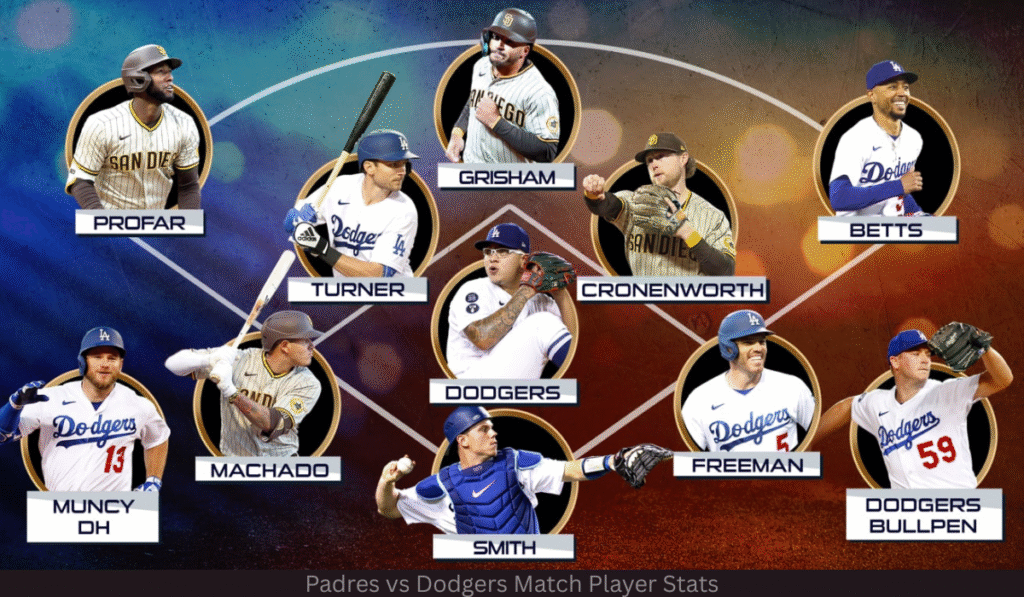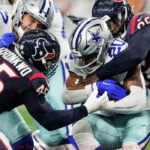The San Diego Padres and Los Angeles Dodgers faced off in a winner-takes-all Game 5 of the 2024 National League Division Series (NLDS) on October 11 at Dodger Stadium, with the Dodgers securing a 2-0 shutout victory to advance to the NLCS. This electrifying matchup, part of a heated rivalry, showcased pitching dominance, clutch hitting, and a Padres offense that couldn’t capitalize on opportunities. This original article delves into the Padres vs Dodgers Match Player Stats, offering a detailed and fresh analysis of individual performances that shaped this pivotal postseason game, drawing on the latest data and insights.
Game Overview: Dodgers’ Pitching Masterclass Ends Padres’ Season
The Dodgers (98-64 regular season) leaned on a masterful performance from starter Yoshinobu Yamamoto and a lights-out bullpen to blank the Padres (93-69), who had the best record in baseball post-All-Star break. San Diego’s Yu Darvish delivered a stellar outing, but the Padres’ bats went silent, stranding nine runners and failing to solve Los Angeles’ pitching. The Dodgers’ victory avenged their 2022 NLDS loss to San Diego and propelled them toward their eventual 2024 World Series title. This game was defined by pitching excellence, timely hitting, and defensive resilience, with the stats revealing the fine margins that decided this high-stakes clash.
Offensive Stars: Dodgers’ Clutch Hits, Padres’ Missed Opportunities
Teoscar Hernández (LF, Los Angeles Dodgers)
- Stats: 1-for-3, 1 HR, 2 RBIs, 1 run scored
- Analysis: Hernández was the offensive hero for Los Angeles, delivering the game’s only runs with a first-inning two-run homer off Darvish. His 417-foot blast to center field, scoring Enrique Hernández, gave the Dodgers an early 2-0 lead they never relinquished. Hernández’s ability to capitalize on a hanging slider showcased his power (33 HRs in the regular season) and postseason poise. His 1-for-3 night doesn’t reflect his impact, as the homer set the tone and allowed the Dodgers’ pitching to dictate the game. Hernández’s clutch performance in Game 5 was a microcosm of his value as a midseason acquisition, finishing the series with a .333 average (5-for-15).
Mookie Betts (RF, Los Angeles Dodgers)
- Stats: 1-for-4, 1 single, 1 run scored (on Hernández’s HR)
- Analysis: Betts, fresh off a postseason slump-busting performance (4-for-9 with two HRs in Games 3-4), went 1-for-4 but played a crucial role. His first-inning single set the stage for Hernández’s homer, and his defensive work in right field, including a sliding catch, helped preserve the shutout. Betts’ .250 series average (5-for-20) with two homers and three RBIs reflects his resurgence after a 3-for-44 postseason drought entering the NLDS. His ability to get on base (3 walks in the series) stretched San Diego’s pitching, creating opportunities for the Dodgers’ lineup.
Enrique Hernández (CF, Los Angeles Dodgers)
- Stats: 1-for-3, 1 single, 1 run scored
- Analysis: Hernández, a postseason standout known for clutch moments, scored the game’s first run after a leadoff single in the first. His hustle and versatility (playing center field due to injuries) were critical, though his offensive output was modest. Hernández’s series performance (4-for-14, .286) included a double and a walk, showcasing his knack for delivering in big moments. His run on Teoscar’s homer proved decisive in a game where every run mattered.
Fernando Tatis Jr. (RF, San Diego Padres)
- Stats: 1-for-4, 1 single, 1 GIDP
- Analysis: Tatis, a postseason dynamo with a .556 average (10-for-18, 3 HRs, 5 RBIs) entering Game 5, was held in check, going 1-for-4 with a ground into double play. His third-inning single put a runner on, but the Padres couldn’t advance him. Tatis’ inability to deliver a signature moment, combined with being doubled up in the sixth, epitomized San Diego’s offensive struggles. Despite his regular-season brilliance (21 HRs, .280 BA) and postseason heroics, the Dodgers’ pitching neutralized him, throwing off-speed pitches to limit his power. Tatis’ series performance remained stellar, but Game 5 highlighted the challenge of facing elite pitching in a do-or-die scenario.
Jurickson Profar (LF, San Diego Padres)
- Stats: 1-for-4, 1 single
- Analysis: Profar, whose Game 2 robbery of a Mookie Betts homer sparked controversy, went 1-for-4 but couldn’t ignite the Padres’ offense. His sixth-inning single put a runner in scoring position, but Evan Phillips retired Manny Machado and Jackson Merrill to strand him. Profar’s .200 series average (3-for-15) belied his regular-season breakout (.280 BA, 24 HRs), as the Dodgers’ bullpen limited his impact. His defensive highlight in left field earlier in the series wasn’t enough to offset San Diego’s offensive woes in Game 5.
Manny Machado (3B, San Diego Padres)
- Stats: 0-for-4, 2 strikeouts
- Analysis: Machado, a cornerstone of San Diego’s lineup, went hitless in four at-bats, striking out twice against Yamamoto and Phillips. His inability to produce in key spots (runners on in the third and sixth) was a dagger for the Padres. Machado’s series stats (.231, 3-for-13, 1 HR) were underwhelming compared to his regular-season output (.275 BA, 29 HRs). The Dodgers’ strategy of pounding him with breaking balls disrupted his timing, and his two strikeouts underscored San Diego’s failure to capitalize on scoring chances.
Pitching Standouts: Yamamoto and Darvish Duel, Bullpen Seals It
Yoshinobu Yamamoto (SP, Los Angeles Dodgers)
- Stats: 5.0 IP, 2 H, 0 R, 1 BB, 2 K, 63 pitches (42 strikes)
- Analysis: Yamamoto, the $325 million rookie, delivered a gem in his first postseason start. His five scoreless innings set the tone, allowing just two hits (singles by Tatis and Profar) and one walk. Yamamoto’s fastball-curveball mix kept the Padres off-balance, generating 10 swings-and-misses. His efficiency (63 pitches) allowed the Dodgers to deploy their bullpen strategically. Despite a regular-season struggle against San Diego (8 ER in 6 IP over two starts), Yamamoto’s Game 5 performance was a statement, lowering his postseason ERA to 0.00 and validating his megadeal. His ability to navigate a potent Padres lineup, which led the NL in batting average (.263), was the game’s defining factor.
Yu Darvish (SP, San Diego Padres)
- Stats: 6.2 IP, 3 H, 2 R (2 ER), 1 BB, 3 K, 86 pitches (59 strikes)
- Analysis: Darvish was brilliant but took the loss, allowing only Teoscar Hernández’s two-run homer in the first. His 6.2 innings of three-hit ball included three strikeouts and one walk, showcasing his veteran savvy. Darvish’s slider and fastball kept the Dodgers’ lineup in check, but the early homer proved costly. His series performance (2 starts, 1-1, 2.45 ERA over 14.2 IP) was stellar, but the lack of offensive support doomed him. Darvish’s 4-6 career postseason record (4.19 ERA) reflects his ability to compete in big moments, but Game 5 underscored the Padres’ reliance on him without enough run support.
Evan Phillips (RP, Los Angeles Dodgers)
- Stats: 1.0 IP, 1 H, 0 R, 0 BB, 1 K, 5 pitches
- Analysis: Phillips earned the win in Game 4 and was lights-out again in Game 5, retiring Profar, Machado, and Merrill on five pitches in the sixth. His efficiency and ability to escape a jam (runners on first and second) were critical in preserving the 2-0 lead. Phillips’ 1.0 scoreless innings in Game 5 capped a dominant series (2.1 IP, 0 R, 5 K), reinforcing his role as a high-leverage reliever. The Dodgers’ bullpen, including Phillips, Alex Vesia, and Blake Treinen, threw 24 straight scoreless innings to close the series, a testament to their depth.
Padres Bullpen (Bryan Hoeing, Jeremiah Estrada)
- Stats: 2.1 IP, 1 H, 0 R, 0 BB, 2 K
- Analysis: San Diego’s relievers kept the game close after Darvish’s exit, with Hoeing (1.1 IP, 0 R) and Estrada (1.0 IP, 0 R) shutting down the Dodgers. However, the early 2-0 deficit was too much to overcome, given the Padres’ offensive struggles. The bullpen’s 3.16 ERA in the second half of the season was a strength, but their efforts in Game 5 couldn’t spark a comeback.
Team Stats: Pitching Dominance and Offensive Disparity
- Total Hits: Dodgers 4, Padres 7
- Runs: Dodgers 2, Padres 0
- Home Runs: Dodgers 1 (Hernández), Padres 0
- Runners Left on Base: Dodgers 3, Padres 9
- Strikeouts: Dodgers 5, Padres 3
- Walks: Dodgers 1, Padres 1
- Pitches-Strikes: Dodgers 108-74, Padres 106-73
- Errors: Padres 1 (Bogaerts), Dodgers 0
- Double Plays: Dodgers 1, Padres 0
The Dodgers’ four hits produced two runs, thanks to Hernández’s homer, while the Padres’ seven hits yielded nothing, with nine runners left on base highlighting their inefficiency. Los Angeles’ pitching staff threw 74 of 108 pitches for strikes (68.5%), compared to San Diego’s 73 of 106 (68.9%), showing both teams’ command. The Padres’ lone error (Bogaerts) didn’t directly cost them, but their inability to convert scoring chances (0-for-6 with RISP) was the difference.
Key Moments That Shaped the Game
- Hernández’s Two-Run Homer (1st Inning): Teoscar Hernández’s first-inning blast off Darvish, scoring Enrique Hernández, gave the Dodgers a 2-0 lead that held up. It was the game’s only scoring play and shifted momentum early.
- Yamamoto’s Escape in the 3rd: With Tatis on first and one out, Yamamoto induced a Machado groundout and struck out Merrill, preserving the shutout and keeping San Diego’s bats quiet.
- Phillips’ 5-Pitch Sixth: Profar’s single and a walk to Arraez put two on with one out, but Phillips needed just five pitches to retire Machado and Merrill, quashing San Diego’s best scoring chance.
- Tatis’ GIDP in the 6th: Tatis’ ground into double play in the sixth, with a runner on, killed a potential rally and epitomized the Padres’ offensive struggles.
- Dodgers’ Bullpen Dominance: Vesia, Phillips, and Treinen combined for four scoreless innings, allowing three hits and striking out three, extending their series-long scoreless streak to 24 innings.
Strategic Insights: What Worked and What Didn’t
Los Angeles Dodgers
- What Worked: Yamamoto’s five scoreless innings and the bullpen’s dominance (4 IP, 0 R) neutralized a Padres offense that averaged 5.0 runs per game in the regular season. Hernández’s early homer provided all the offense needed, and the Dodgers’ defense, led by Betts and Tommy Edman, was flawless. Manager Dave Roberts’ decision to pull Yamamoto after 63 pitches preserved the bullpen’s freshness.
- What Didn’t: The Dodgers’ offense, outside of Hernández’s homer, was quiet (4-for-28, .143 BA). Shohei Ohtani’s 1-for-3 performance (.250 series average, 1 HR) was underwhelming, and Freddie Freeman’s absence (ankle) forced lineup adjustments. Still, their pitching carried the day.
San Diego Padres
- What Worked: Darvish’s 6.2 innings of two-run ball gave the Padres a chance to stay in the game, and the bullpen (Hoeing, Estrada) prevented further damage. Luis Arraez’s 2-for-4 night (.400 series average) showed his contact skills, but he couldn’t score.
- What Didn’t: The Padres’ offense, which led the NL in hits (1,455) during the regular season, went 0-for-6 with runners in scoring position and stranded nine runners. Tatis and Machado’s combined 1-for-8 with three strikeouts and a GIDP crippled their chances. The decision to start Darvish on regular rest was sound, but the offense’s failure to support him was the downfall.
Looking Ahead: Implications for Both Teams
Los Angeles Dodgers (NLCS Bound, 2024 World Series Champions)
The Dodgers’ Game 5 victory showcased their pitching depth and resilience, despite missing Freddie Freeman and relying on a patchwork lineup. Their bullpen’s 24 scoreless innings to close the series was a postseason record, setting the stage for their NLCS matchup against the New York Mets and eventual World Series triumph over the Yankees. With Ohtani, Betts, and Hernández leading the offense, and Yamamoto emerging as a postseason ace, the Dodgers solidified their status as a dynasty, winning their second title in five years. Their ability to win low-scoring games bodes well for 2025, though Freeman’s ankle and bullpen workload remain concerns.
San Diego Padres (Season Ended, 22-34 Postseason Record)
The Padres’ loss was a heartbreaking end to a season of growth, finishing with a franchise-record 93 wins and a postseason-clinching triple play against the Dodgers. Their offense, led by Tatis, Machado, and rookie Jackson Merrill (.294 BA, 20 HRs), faltered at the worst time, scoring just 12 runs in the final three games. Darvish and Michael King (7 IP, 0 R in Game 3) proved the rotation’s strength, but the offense’s inability to deliver in clutch moments (9 LOB in Game 5) was costly. With young stars like Merrill and a tight-knit clubhouse, the Padres are poised for another run in 2025, but they must address their postseason RISP woes (4-for-22 in the series).
Conclusion: A Pitching Duel Defined by Fine Margins
The Padres vs. Dodgers Game 5 on October 11, 2024, was a masterclass in pitching and defense, with the Dodgers’ 2-0 victory hinging on Teoscar Hernández’s early homer and a relentless bullpen. Yamamoto’s five scoreless innings and Phillips’ clutch relief work outdueled Darvish’s valiant effort, while San Diego’s stars—Tatis, Machado, and Profar—couldn’t break through. The stats tell a story of efficiency (Dodgers: 4 hits, 2 runs) versus missed opportunities (Padres: 7 hits, 9 LOB), underscoring the razor-thin margins of postseason baseball. This game, the third postseason clash between these rivals in five years, added another chapter to their storied rivalry, with the Dodgers’ pitching prowess proving the difference.
As the Dodgers celebrated their NLCS berth and eventual World Series crown, the Padres were left to reflect on a season of promise cut short. The player stats—Hernández’s game-changing homer, Yamamoto’s dominance, and San Diego’s stranded runners—will fuel discussions about what could have been and what lies ahead for these NL West powerhouses. The “Dodgers-Padres Rivalry” continues to deliver drama, and 2025 promises more fireworks.



